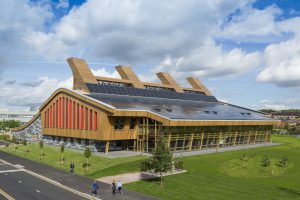January 30, 2020, by sustainablenottingham
Energy in 2019: A Round Up
Guest post by Bryony Attenborough, Energy Manager at UoN.
So here we are again, the start of a new year, the start of a new decade and a leap year, to boot! I’d like to go back, and bamboozle you with a couple of facts…last year saw UK renewables generating more electricity than fossil fuels for the first time. During July, August and September renewables outpaced fossil fuels since the UK’s first public electricity generating station opened in 1882. Interestingly, 1882 was the same year that the University of Nottingham department of Chemical and Environmental Engineering ran the first mining classes given as night classes at University college!

The GSK Carbon Neutral Laboratory for Sustainable Chemistry, one example of the utilisation of renewable energy at UoN
Anyway, back to 2019
We have continued our trend of reducing energy consumption and carbon emissions across the campuses.
“Why is that important?” I hear you ask. It is important because in a time where our campus size, student numbers and our reliance on technology such as iphones, ipads, computers and energy intensive equipment, is increasing, we haven’t increased our energy impact.
In 2019, University of Nottingham energy consumption decreased by 4% and our carbon dioxide (CO2) emissions from fossil fuel and electricity, classed as Scope 1 and 2, have shown an absolute reduction of 7%. In fact, in Christmas week alone University Park used 5% less electricity than last year! We are well on the way to achieve our 2020 carbon reduction target of a reduction of 41,000t CO2 and to support Nottingham City Council’s 2028 carbon neutrality aims, HOWEVER this cannot be achieved without everyone doing their bit… Look around where you work, study, dine and live, and see what can you do to reduce your impact.
Do you really need that light on? Could you turn equipment off rather than leaving on standby when it’s not in use? Do you need to print that?
For further advice or information please visit the Carbon and Energy webpage
No comments yet, fill out a comment to be the first

Leave a Reply